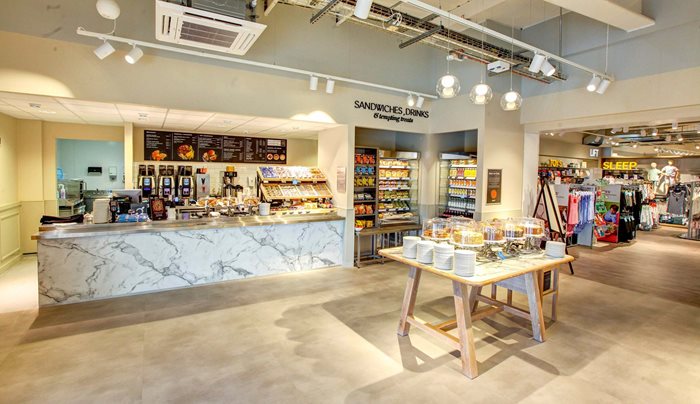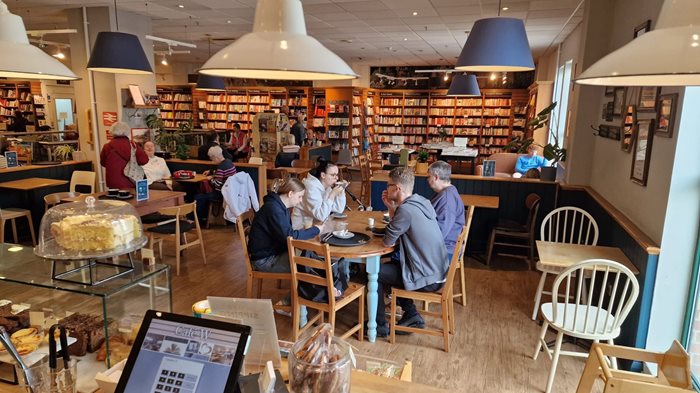Amid a tough trading environment on UK high streets, retailers and hospitality operators are increasingly deploying high-quality coffee offers to drive much-needed footfall, boost sales and foster brand loyalty. 5THWAVE speaks to the brands taking a leaf out of the café playbook – and generating new business opportunities among caffeine-obsessed consumers
.jpg.aspx?lang=en-GB&width=700&height=393)
Shoppers on a London high street | Photo credit: William Barton / Shutterstock
Coffee shops have been one of the key success stories on UK high streets over the last two decades. With more than 10,100 outlets and generating annual sales of more than £5.3bn ($6.7bn) the UK branded coffee chain segment has achieved over 20 years of outlet growth – only briefly interrupted by the pandemic.
However, the wider UK high street has faced decline amid weakened demand for in-person retail driven by a boom in online sales and a tough property market. In 2009, the bombshell collapse of Woolworths, which had traded in the UK for a century, underlined a worrying trend for traditional retail chains struggling to adapt to new trading realities on the high street.
Retail businesses accounted for 19% of UK administrations in 2023 – the highest of all sectors according to analysis from London-based law firm Shakespeare Martineau – with Wilko, M&Co, Paperchase and Debenhams notable recent casualties.
“Coffee can play a major part in revitalising physical retail”
– Ibrahim Ibrahim, Managing Director, Portland Design
Further underlining the challenges facing high street traders, the British Beer & Pub Association (BBPA) report that more than 500 pubs permanently closed their doors in 2023 while 645 bank branches shuttered, according to consumer rights advocacy group Which?
In the face of difficult trading conditions and a 14% high street unit vacancy rate, coffee has become a powerful way for retail businesses to boost sales, drive footfall and foster brand loyalty.
“Coffee can play a major part in revitalising physical retail and can transform high street businesses from places of transaction to places of local communities,” says Ibrahim Ibrahim, a retail strategy expert and Managing Director of London-based design agency Portland Design.
“Introducing coffee into different retail categories can encourage people to visit and dwell and transform shops into meeting places,” Ibrahim adds.
With a buoyant UK branded café market generating soaring consumer demand for premium coffee everywhere, businesses of all kinds are lining up to serve them.
“Our cafés draw in customers, acting as a destination and beacon”
– Alicia Thompson, Hospitality Director, M&S Food
Coffee to the rescue
Long a fixture of UK high streets and town centres, department stores have faced significant decline due to competition from online trade and soaring property costs – with House of Fraser, Fenwick and Debenhams all collapsing into administration in recent years after struggling to adapt to changing consumer preferences.
However, unlike many of its contemporaries, Marks & Spencer (M&S) has bounced back from a period of decline after successfully investing in its food halls and hospitality sites.
The food, clothing and homeware retailer has operated in-store cafés since 1935 and launched its most modern iteration, M&S Café, in 2007. Coffee has played a central role in M&S’ reinvention and the retailer now serves more than 36 million hot beverages each year across its 320 M&S Cafés, which were given a digital-first makeover in June 2021.
Following a £480m ($586m) stores restructure programme in January 2023, the M&S Café brand now encompasses ‘coffee-first’ coffee shops, bakery-cafés within its food halls and a self-serve coffee-to-go concept across transport hub and petrol station locations.
“The future of retail is experiential – that is why having a thriving café business with excellent customer service is key. Our cafés draw in customers, acting as a destination and beacon, encouraging customers to spend more time with M&S,” says Alicia Thompson, Hospitality Director, M&S Food.

Interior of an M&S Café in St Helens, UK | Photo credit: Courtesy of Marks & Spencer
M&S Café has also upgraded its coffee offer by training 1,800 master baristas who pour latte art in every cup in a bid to deliver the same “incredible coffee and food experience” customers would get in a specialty coffee shop.
“We see the M&S Café as the jewel in M&S Food’s crown. Over the past 12 months, we have started on a journey to becoming truly famous for coffee. Come September 2024, we will have launched a new coffee brand, crafted by expert coffee makers,” Thompson says.
With M&S Café diversifying its beverage range to include bubble teas, tiramisu lattes and Magic Coffee’ – a beverage comprising ristretto and steamed milk and touted as the next flat white – the retailer has successfully tapped into growing consumer demand for premium beverages whenever and wherever they are.
Waitrose is another food retailer deploying a high-quality coffee offer to boost customer engagement, although its approach has been markedly different from M&S.
The supermarket group began offering MyWaitrose loyalty members free coffee and newspapers in 2013. Described by then Waitrose Managing Director Mark Price as ‘disruptive’, the loss leader was designed to significantly boost MyWaitrose membership and became so popular that several independent café businesses complained to the UK’s competition authority.
Significantly, it achieved Waitrose’s aims, boosting the brand’s loyalty membership from 1.8 million in 2012 to four million within 12 months.
Today, coffee remains a key benefit for the premium supermarket chain’s nine million-plus loyalty members. In October 2023, Waitrose made a further investment in its coffee credentials and began serving premium Caffè Nero coffee across its 320 self-serve machines and 130 in-store cafés. It now also operates an in-store Gail’s takeaway site at its Canary Wharf supermarket.
Brands on the same page
For UK book retailer Waterstones, coffee has been far more than a loss leader to encourage footfall and has developed into a profitable part of the business in its own right.
Having previously operated Starbucks and Costa Coffee concessions, Waterstones began rolling out its own-brand Café W coffee shops in May 2012 – a concept now present in 76 of its more than 300 UK stores – building a café offer ‘exclusively for bookshop customers’.
“We have a shared retail structure between cafés and bookshops”
– Emma Smith, Café Development Manager, Waterstones
“We have a shared retail structure between cafés and bookshops, working as one team, celebrating what is the same between specialist book selling and specialty coffee and those customers who love both,” says Emma Smith, Café Development Manager, Waterstones.
Tailored for longer dwell times, Smith says Café W has the freedom to focus on service over speed and maximises café space as a community hub by hosting games nights, author signings and book clubs without having to get approval from licensed café partners.
The bookshop chain has partnered with specialty coffee roaster Union Hand Roasted Coffee for the last 10 years, is meticulous with barista training and has incorporated café purchases into its Waterstones Plus loyalty programme. In doing so, Smith says the Café W business has gone from strength to strength.
“Café W is definitely a profitable offshoot of the core business. It is a small part, but where it exists it is an increasingly significant and valued part of the Waterstones experience and identity,” she adds.

A Waterstones Café in Edinburgh, UK | Photo credit: Courtesy of Waterstones
Hybrid retail and coffee concepts are proving popular across the UK retail landsape. In November 2023, wellness retailer Holland & Barrett began trialling a new takeaway ‘Drinks with Benefits’ service at its Birmingham store – offering barista-prepared organic teas and coffees s fortified with vitamins, aimed at promoting mental focus, energy and immunity. Even banking giants Lloyds and Santander are filling coffee cups to add customer service value at their branches.
In February 2022, affordable clothing retailer Primark collaborated with value-focused bakery chain Greggs to launch the ‘Tasty by Greggs’ café concession – a savvy partnership that also led to a co-branded clothing and merchandise collection.
“We took the giant step to introduce cappuccinos and lattes”
– Tim Martin, Founder, JD Wetherspoon
From ales to coffee sales
Founded in 1979, value-focused pub chain JD Wetherspoon has since expanded to 809 venues across the UK and has become a fixture on UK high streets. The group has not been immune to the pressures facing the pub sector and closed approximately 140 net sites over the last eight years; however, the business continues to perform strongly, with half-year revenues growing 8% to £991m in the 26 weeks to 28 January and total sales approximately 33% higher than in 2015.
Today, food and app-based table service is an increasingly important part of JD Wetherspoon’s business, but according to Founder Tim Martin, coffee has become a huge earner for the pub group.
Martin recalls introducing Rombouts pourover coffee in his first pub in Muswell Hill, London. However, it wasn’t until 20 years later that he was convinced to broaden Wetherspoons’ coffee range after passing a busy central London Starbucks.
“It didn’t take a Warren Buffett business brain to work out that coffee was an expanding market. So, we took the giant step to introduce cappuccinos and lattes, which was a major investment for a pub company,” he says.
Wetherspoons partnered with Lavazza in 2005 and serves filter coffee, flat whites, cappuccinos and lattes, as well as tea and hot chocolate, from as little as £1.20 ($1.53) in some areas of the country.
“We’d been annoying ale drinkers over the time it took staff to make cappuccinos. So, we made another big investment and switched to free, self-serve refills,” Martin says.
Despite Lavazza “probably being more profitable for Lavazza than for JD Wetherspoon”, Martin says coffee is currently the pub chain’s overall bestselling beverage having grown in popularity during the cost-of-living crisis, especially among students and retirees.
Investing in a premium coffee offer has also proved a savvy move for UK pub groups Greene King, Admiral Taverns and St Austell, with the latter launching its own-brand Brewer & Bean coffee blend in 2014 and opening a standalone Brewer & Bean café in 2017.
With UK consumers’ thirst for premium coffee and café culture showing no signs of slowing, there is a growing opportunity for hospitality operators and in-person retailers of all kinds to share in the success of the UK coffee shop market. In the face of difficult trading conditions, vacant shopfronts and the unstoppable ascent of online shopping, coffee is fast becoming the lifeblood of UK high streets.
This article was first published in Issue 20 of 5THWAVE magazine.
Subscribe to 5THWAVE to receive each edition in print and digitally or sign up to our newsletter and be the first to read the latest articles and updates on World Coffee Portal research.
.png.aspx?lang=en-GB&width=700&height=180)